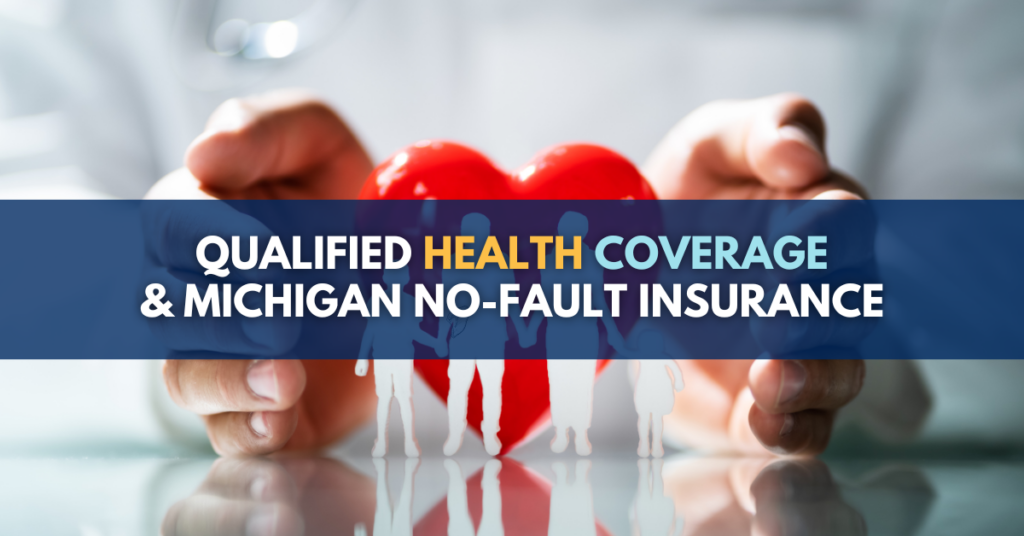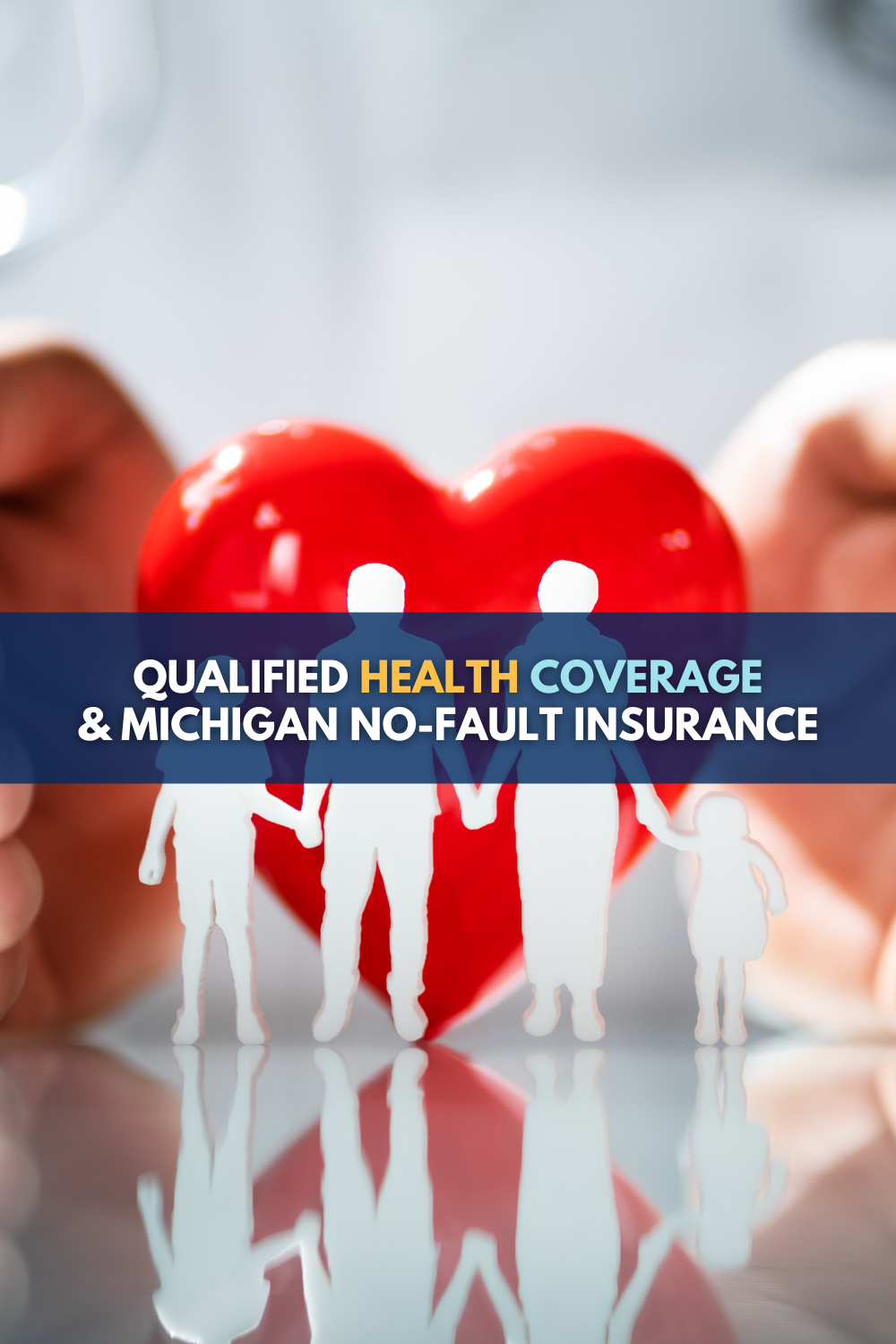
Drivers may need “qualified health coverage” (QHC) in order to save money on their Michigan No-Fault car insurance law. To select a lower PIP medical coverage level – which is presumably supposed to cost less – a driver must have his or her own health insurance that meets the No-Fault’s QHC requirements.
Under Michigan’s auto No-Fault law, drivers can select the level of No-Fault PIP medical benefits coverage they wish to purchase as part of their insurance policy.
However, some of these lower coverage levels – which provide less coverage for lower cost – may not be available if the driver or certain family members did not have the right type of health insurance coverage. This “right type of health insurance” is what the No-Fault law refers to as “qualified health coverage.”
In other words, if a driver – or a family member – does not have health insurance that qualifies, then a driver will be locked out of any savings, i.e., paying less for less coverage under the lower PIP medical coverage level.
What is qualified health coverage (QHC) in Michigan?
In Michigan, qualified health coverage is the insurance that the No-Fault insurance law requires drivers to have to be able to select certain PIP medical benefit levels. To ensure your health plan meets the requirements of the law, it must not exclude or limit coverage for car accident-related medical care.
The Michigan No-Fault insurance law defines this coverage in two ways:
- It is “health or accident coverage” that “does not exclude or limit coverage for injuries related to motor vehicle accidents” and its “annual deductible for coverage” must be “$6,000 or less per individual.” (MCL 500.3107d(7)(b)(i)(A) and (B))
- Or it is Medicare coverage. (MCL 500.3107d(7)(b)(ii))
Check out our video to learn more about what this coverage is under Michigan’s No-Fault auto insurance law:
Do I need qualified health coverage?
Yes. In order to select certain lower and presumably cheaper levels of No-Fault PIP medical benefits, you or a family member will need to have health insurance that meets the requirements of qualified health coverage under the Michigan No-Fault law.
These are the relevant coverage levels and requirements:
- The $50,000 coverage level for drivers “enrolled in Medicaid” requires that the driver’s spouse or relative who lives in the same home have QHC, be “enrolled in Medicaid” or have his or her own No-Fault auto insurance policy. (MCL 500.3107c(1)(a)) That means that if a driver’s spouse or family does not have Medicaid or No-Fault or insurance, through a private plan or through Medicare, that meets requirements of qualified health coverage under the Michigan No-Fault insurance law, then the driver cannot select the $50,000 level.
- The total opt-out of No-Fault PIP medical benefits for a driver who has Medicare requires that his or her spouse or family member that lives with the driver either have qualified health coverage that is required under the Michigan No-Fault insurance law (i.e., insurance for accident-related medical care through a private plan or through Medicare) or have his or her own No-Fault auto insurance policy. (MCL 500.3107d(1))
Additionally, QHC plays a role in the coordination of health and No-Fault coverage:
- A driver who chooses the $250,000 coverage level for No-Fault PIP medical benefits under MCL 500.3107c(1)(b) can coordinate his or her No-Fault insurance with his or her health insurance in return for a 100% reduction on his or her PIP medical premium, but only if (1) the driver has private health insurance that meets the laws requirements and (2) the driver’s spouse or family members have QHC through a private health plan or through Medicare. (MCL 500.3109a(2)(a))
Why is QHC so important under the Michigan No-Fault insurance law?
Qualified health coverage is important because without it drivers will not be able to take advantage of the insurance options under the Michigan No-Fault insurance law which will presumably allow drivers to pay less for insurance (because they are getting less coverage).
- The $50,000 coverage level is expected to provide “average” (not individual) savings of 45%. (MCL 500.2111f(2)(a))
- The opt-out for drivers on Medicare is expected to “result in no premium charge for coverage” for No-Fault PIP medical benefits. (MCL 500.2111f(3))
- When health insurance is coordinated with the $250,000 coverage level (assuming all of the required persons have the necessary qualified coverage), the “premium for [No-Fault PIP medical] benefits payable under section 3107(1)(a) under the policy must be reduced by 100%.” (MCL 500.3109a(2)(a))
Qualified health coverage vs Michigan No-Fault insurance
The notion that drivers will be able to “save” money by purchasing lower levels of No-Fault PIP medical coverage (presumably at a correspondingly lower cost) and shifting their reliance for medical coverage onto their health insurance is based on the ideas that: (1) health insurance is cheaper than auto insurance; and (2) that it will continue to be cheaper.
This is where promises of lower auto insurance premiums smack into the reality of increased health insurance costs.
Health insurance has been perceived as being less costly than No-Fault. A big reason for this is that historically many health care plans either do not cover medical services for car accident-related injuries, or drastically limit coverage for these medical services.
Consequently, by excluding or limiting coverage of such a wide range of claims, health insurers drastically minimize their exposure risk (i.e., the chance they will have to use the premiums they collected to pay out on claims to the people who paid the premiums), and thus they charge a little less for their product.
But the “qualified health coverage” requirement under the No-Fault law effectively undoes much of this dynamic.
Because the only health insurance coverages that will meet the No-Fault law’s QHC requirements are plans that do “not exclude or limit coverage for injuries related to motor vehicle accidents,” health insurance will now have to provide the same coverage to auto accident victims that No-Fault does – and has been providing since 1973.
Therefore, we can bet that our health insurance costs will go up – and that employers who provide health insurance will likely be passing these increased costs onto the rest of us. These increased costs will likely eat away at any “savings” that drivers will see on their auto insurance premiums by choosing lower levels of No-Fault PIP medical benefits coverage.
How do I know if I have the right health coverage?
To confirm that your health insurance coverage meets the requirements under the No-Fault law, ask for documentation from your health insurer. They are required to prepare and provide this documentation.
In Insurance Bulletin 2023-17-INS, entitled “Qualified Health Coverage Under the No-Fault Act” and issued on June 22, 2023, Michigan’s Insurance Commissioner stated that, because “individuals who have QHC” are allowed “to make certain choices regarding the dollar limit for personal protection insurance (PIP) medical coverage under a no-fault auto policy,” “[h]ealth insurers and health plans must offer to policyholders upon request a document that indicates whether a person’s coverage is QHC for purposes of no-fault insurance under MCL 500.3107d(7)(b)(i).”
Find out more about the car insurance you need
For our advice on how to best protect yourself and your family under Michigan’s new No-Fault law, please check out our blog post, “How Much Car Insurance Do I Need in Michigan?,” and order a copy of your FREE e-book, “How much car insurance do I need?”



